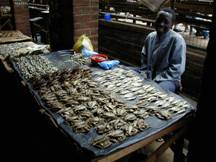Policy and Institutional Framework Review of the fisheries sector in Malawi
Published on July 11, 2011 at 2:50 PM by FACE OF MALAWI
A review of the poorly performing policy and institutional framework of the fisheries sector in Malawi
Authors: B. Chinsinga
Publisher: Chancellor College, University of Malawi, 2008
This paper presents issues for consideration in the development of a proposal for possible funding to address the policy and institutional framework for the fisheries sector in Malawi. It is based on consultations with officials from the Department of Fisheries (DoF), donor agencies, non-governmental organisations (NGOs), district level officials and fishing communities in Mangochi district.
The consultations were complemented with desk review of key documents and literature on the fisheries sector in Malawi and beyond. The policy and institutional framework requires review in light of the dismal performance of the sector since the turn of the 1990s despite several efforts to promote fisheries as a key component of rural livelihood portfolios through aquaculture and sustainable exploitation of capture fisheries.
The next section of this paper delineates the country and sectoral context for fisheries in Malawi. In doing so it:
- Examines the importance of the fisheries sector in the country including its current status in a historical perspective as the basis for further justifying the review of the policy and institutional framework for the sector.
- Discusses the issues that have been identified as requiring attention in any drive to ensure that the fisheries sector realises its development potential.
- Offers some key conclusions about the policy and institutional status of the fisheries sector and a broad indication of areas for possible action.
After further reflections on how to fine-tune the policy and institutional framework for the fisheries sector, the author draws the following conclusion:
- The question of rampant decline in the stocks of fisheries appears to be beyond debate. All accounts project a grim future of the fisheries sector if the current efforts to reverse the trend do not succeed.
- The policy and institutional framework has not been sufficiently effective in promoting sustainable fisheries management underlined by the continued decline in the stocks of fisheries.
- The reforms implemented to date have been carried out without adequate understanding and appreciation of the implications of the politics of institutional formation, maintenance and change.
- Institutional changes in the management of fisheries have not always been matched by corresponding capacity development initiatives targeted at personnel that are expected to oversee the implementation of the changes.



